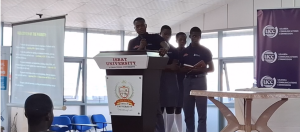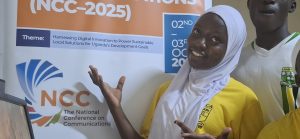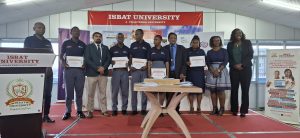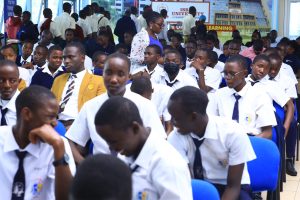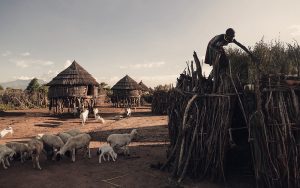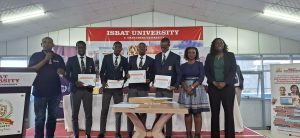Young Innovators Shine at Western Regional ICT Club Competitions
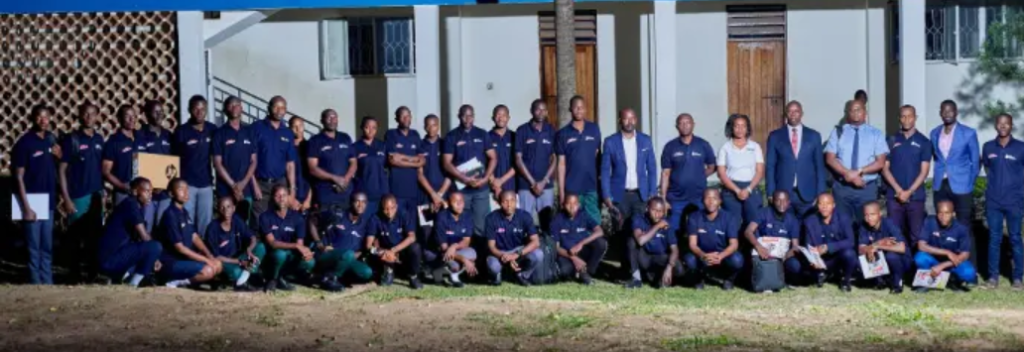
The Western Regional Secondary School ICT Club Competitions were held in Mbarara City at the historic Mbarara High School, bringing together twelve secondary schools from across the region. The event showcased exceptional creativity, teamwork, and technological talent, cementing its place as one of Uganda’s most anticipated student ICT showcases of the year.
The atmosphere was vibrant as students presented innovative projects ranging from platforms that enhance data security and storage to systems promoting ICT literacy, digital inclusion, and community development. Each project represented a unique blend of youthful imagination and practical problem-solving, demonstrating how Uganda’s secondary school learners are contributing meaningfully to the nation’s digital transformation.
These competitions not only celebrated innovation among young people but also provided a platform for them to exchange ideas, sharpen problem-solving skills, and gain exposure to real-world ICT challenges. Through their presentations, the students showcased their potential to lead Uganda toward an ICT-driven and knowledge-based economy.
Participating Schools and Their Projects
Mbarara High School, the host institution, presented EduSafari, a digital platform designed to improve academic accessibility and streamline communication among students and teachers. The system aims to make learning resources more interactive and available online, strengthening digital learning experiences within schools.
Timbitwire Girls’ School from Bushenyi District showcased FileBob: Empowering Digital Access and Secure File Management Through Cloud Technology. This innovation focuses on secure storage and file sharing for schools, promoting data protection and efficiency in managing academic records.
Kashenshero Girls’ Secondary School from Mitooma District introduced a School-Based Blogging System that empowers student voices through online writing and peer collaboration. The project promotes communication skills, responsible digital citizenship, and student journalism in secondary schools.
St. Mary’s College Rushoroza from Kabale District presented Intelli Tutor AI – Empowering Minds, One Answer at a Time. This artificial intelligence–powered tutoring platform supports personalized learning by providing instant feedback and adaptive educational assistance to students across different subjects.
Kazo Secondary School in Kazo District developed an Academic Follow-up System to enhance parent-teacher-learner engagement. The platform facilitates communication between stakeholders, helping parents monitor student performance and encouraging accountability within the education process.
Butogota Trinity College from Kanungu District impressed the judges with a Digital Market Linkage System for Farmers and Traders in Butogota Town Council. This platform enables farmers to connect directly with buyers, improving access to markets and reducing post-harvest losses while promoting agribusiness growth.
Nakivale Secondary School from Isingiro District presented MindFlow, an advanced digital learning platform that integrates lesson materials, virtual exercises, and analytics to enhance both teaching and learning. The project’s user-friendly design makes it especially beneficial for refugee and host community learners in Isingiro.
Nyakahita Muhirwa Vocational Secondary School from Mitooma District showcased their project titled Enhancing Science Education in Secondary Schools. It provides digital science resources, simulations, and video tutorials to make science lessons more interactive and understandable for learners.
Kigezi High School from Kabale District developed a Smart Carbon Monoxide Air Quality Monitoring System. This innovation uses digital sensors to monitor air pollution levels, raise community awareness, and promote environmental health and sustainability in urban areas.
St. Leo’s College Kyegobe from Kabarole District presented Soma Analytics, a smart classroom assistant that analyzes learner participation and helps teachers personalize lesson delivery. The project aims to use data analytics to support continuous assessment and classroom efficiency.
Bweranyangi Girls’ Secondary School from Bushenyi District showcased a project on Breast Cancer Prediction Using Machine Learning. The system uses AI algorithms to identify early warning signs, supporting preventive health education and awareness among young women.
Bubangizi Secondary School from Mitooma District designed a Garbage Collection Management System to address waste management challenges in local communities. The digital system tracks collection schedules, encourages recycling, and promotes environmental conservation.
And the Winners Are…
🥇 1st Place – Nakivale Secondary School
🥈 2nd Place – Kigezi High School
🥉 3rd Place – Timbitwire Girls’ School
The top three schools were celebrated for their innovative projects that demonstrated strong technical application, community impact, and alignment with Uganda’s sustainable development goals.
The Road to NCC 2025
The victory means Nakivale Secondary School will represent the Western Region at the National ICT Clubs Competition Finals during the National Conference on Communications (NCC 2025), scheduled for 2nd–3rd October 2025 at the National ICT Innovation Hub, UICT Nakawa.
This year’s national event will be jointly hosted by ISBAT University and Gulu University under the theme:
“Leveraging Digital Innovation to Empower Sustainable Local Solutions for Uganda’s Development Goals.”
As the regional champions advance to the national stage, Uganda’s brightest young innovators are preparing to share bold ideas, collaborate with peers from other regions, and shape the nation’s digital future.
The Western Regional ICT Club Competitions stand as a strong testament to the transformative power of ICT in education and community development—proof that Uganda’s next generation of digital leaders is already rising.

